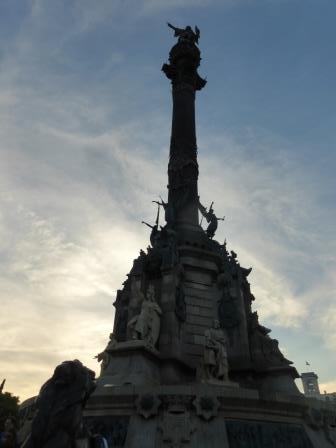It is hard to defend Christopher Columbus, yet he must be considered, as he looms large over us and will to the indefinite future. Try as you might, detest him as you will, he cannot be removed from our past. Where we are today is a consequence of what he did then. What we should not do is use him as a scapegoat for all our problems today.
Columbus was a sailor, which should probably stand as a warning as to character from the get go. He had traveled widely in his years at sea, including Constantinople, and possibly to the North Atlantic. It is commonly held that he had to fight the belief that the earth was flat, but it was widely understood that the earth is a sphere and there were reliable estimates as to size. Columbus tried for a number of years to get funding for a proposed expedition westward to Japan, including from Spain and Portugal. The real opposition to his plan was the expectation that it would not be possible to carry enough provisions for the expected distance. So Columbus fudged. He sold his plan on the basis of a much shorter voyage and ultimately the Spanish monarchy bought it. Obviously, neither he nor they expected that there would be an entire continent in the way. The argument is made that he may have deliberately underestimated the distance, but to the end of his life he insisted that he found Japan.
Whether through error or deliberate miscalculation, on October 12, 1492, the old world found the new and the age of exploration began in earnest. It also marked the end of the native civilizations of the new world and it is impossible to conjecture what might have been. For all that might have been, it must not be forgotten that even the most sophisticated civilizations on either continent lacked the wheel, the horse or other domestic animals, a significant factor in the development of the old world.
That lack of domestic animals played a large part in what would follow. Detractors point to the decimation (not really the right word but that is something for another blog) of native populations. it is not something that can be laid at Columbus feet alone. It is generally understood that Europeans developed immunity to many diseases because of their association with domestic animals. Think swine flu for example. The natives of the Americas had none. In short, even if Columbus showed up in full Haz-Mat, they were doomed. Estimates suggest that as many as 90% of natives succumbed to “European” diseases. It is also possible that a pandemic had occurred shortly before Columbus arrived. Ironically, the same thing happened prior to the arrival of the Mayflower. Those settlers found a largely empty region and many abandoned villages.
Slavery is another issue, but it is wrong to blame it wholly on Columbus. It is a rather more complicated matter. The treatment of the natives is a sordid story, but in truth and to their credit, they did not make good slaves. Bartolome Del Las Casas was a great defender of the native population, but he suggested that Africans would be better suited and thus inadvertently started what we, and he, would come to regret. In Columbus’ defense, it must be remembered that slavery was a commonplace at the time. In order to fund his expedition, he had promised the riches of the East, particularly Japan, to Ferdinand and Isabella and had to produce something. In short, he was in hock to the mob. If you ever watched The Sopranos, you would understand how that might work out. We can lament it all we want from our lofty vantage point, but it was a fact of life and very much an inevitability. And if you are going to put De Las Casas above Columbus, keep in mind that it was he who shifted the rationalization of slavery to a matter of race rather than as spoils of war.
Finally, yes, Columbus discovered the New World. Yes, there were people already there. Yes, there was previous contact with Europeans, mainly the Norseman, Leif Ericsson several centuires earlier. There were also other possible contacts, but October 12, 1492 stands out as the date that a general understanding of the existence of entire continents previously unknown to Europeans did exist. All that followed hinged on the event on that date. No matter how you wish to name it, it is a date that should be marked and never forgotten.
*The rather large photo at the head of this post is of the monument to Columbus in Barcelona. The size perhaps suggests the enormous consequence of Columbus voyage and what followed from it.

The really big thing that Columbus did was publish his findings. All the others considered the discoveries to be a secret that they wanted to keep for themselves. But getting Royal support required publication of his discoveries.
LikeLike